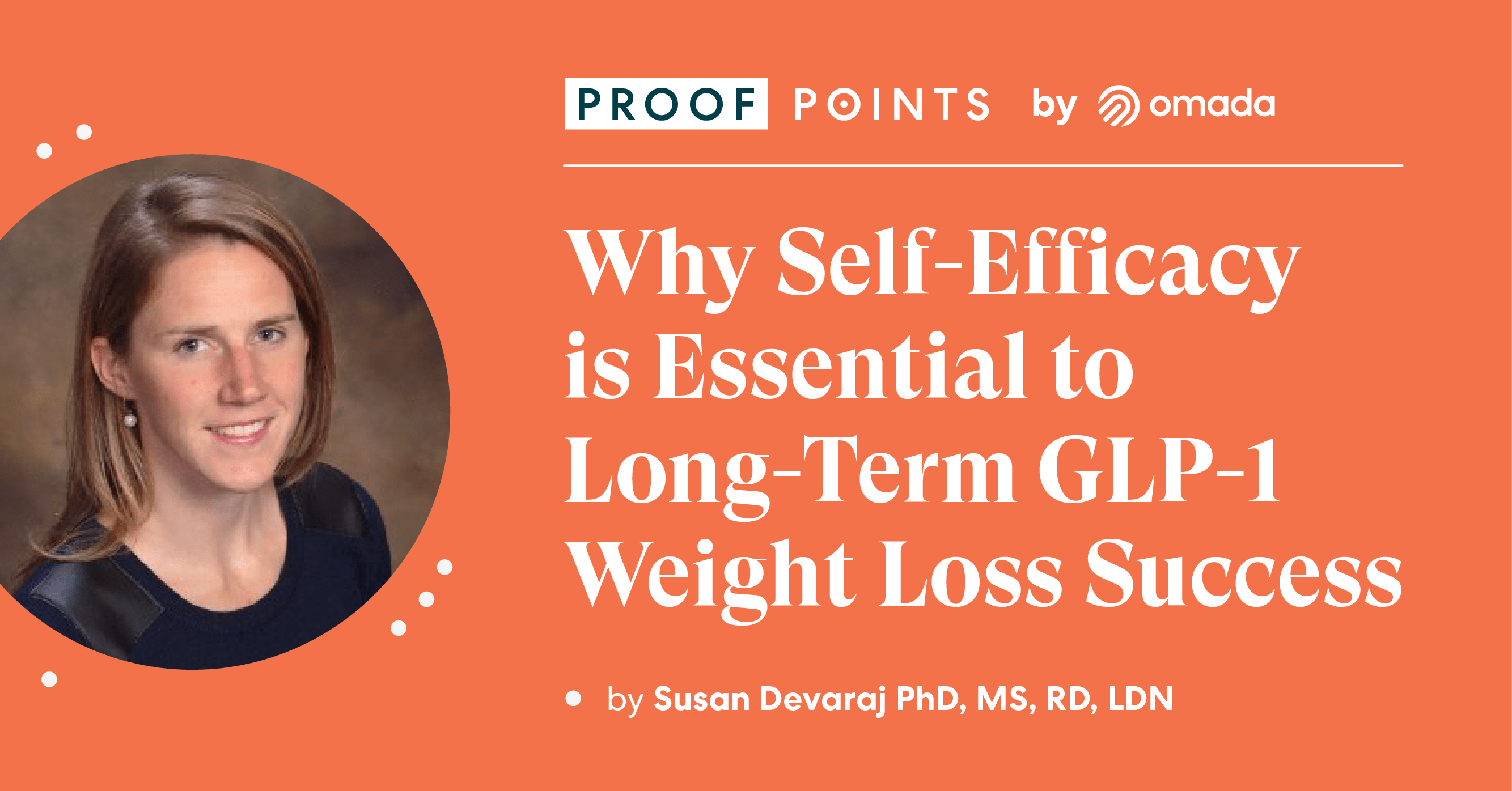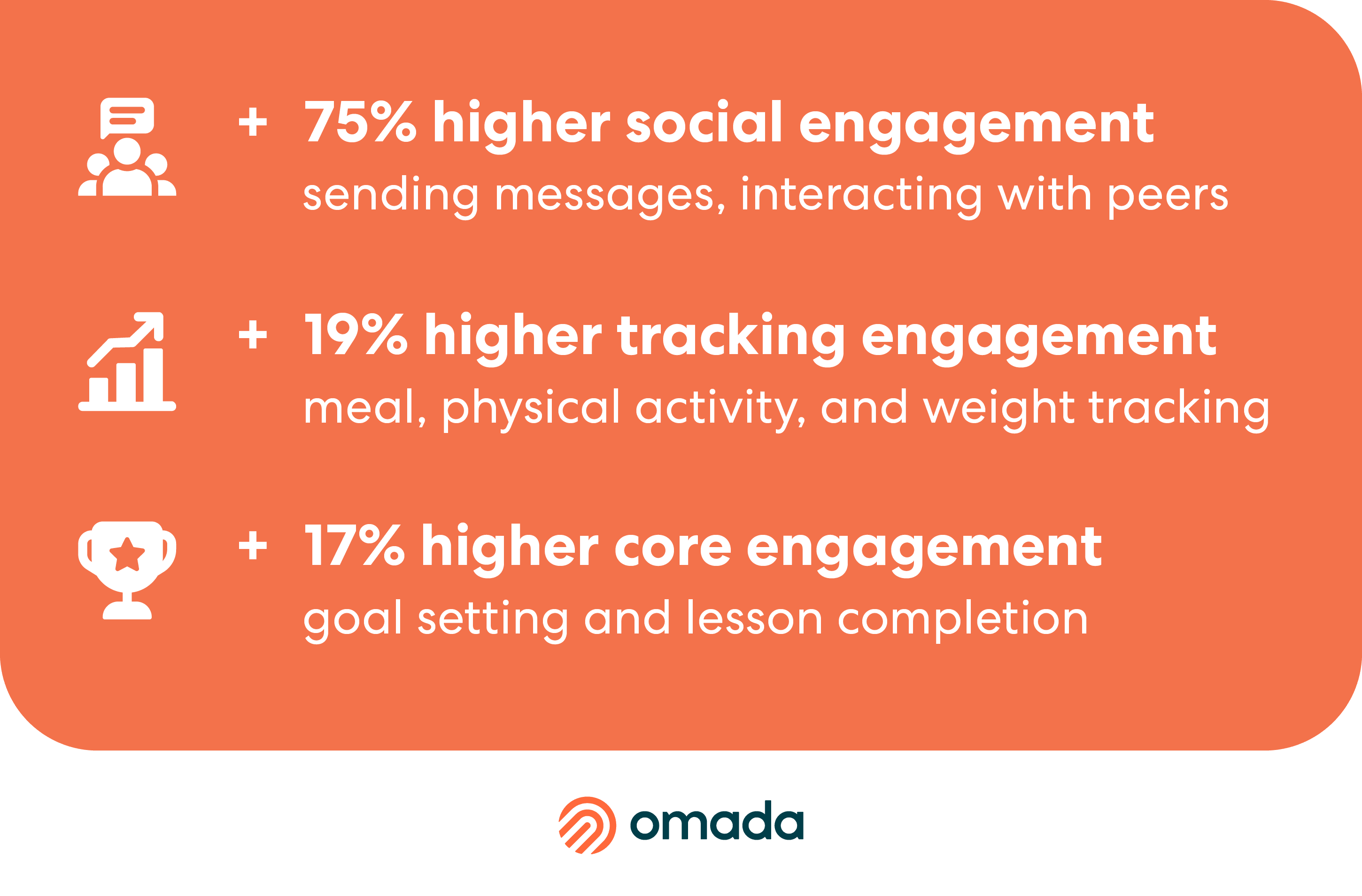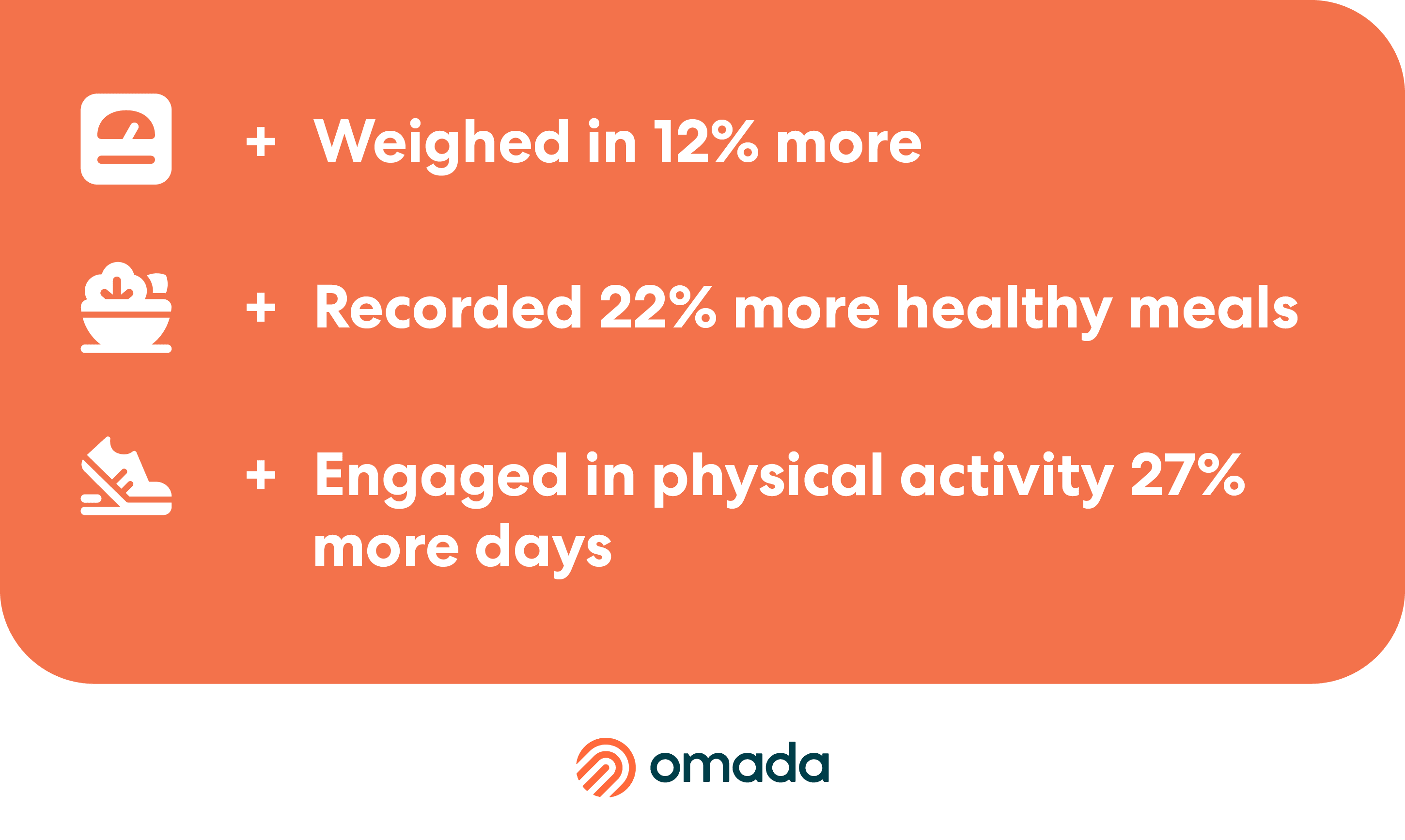Building Self Efficacy in the Era of GLP-1s

This edition covers:
- Early outcomes of Omada’s Enhanced GLP-1 Care Track
- Understanding self-efficacy in the weight loss journey
- Redefining GLP-1 weight loss success
If you’re reading this, you’re likely aware that GLP-1 usage continues to skyrocket. With one in every eight American adults having already tried a GLP-1, it’s safe to assume that recent New Year’s resolutions will mean an onslaught of new prescriptions. This is due in large part to the medication class’s revolutionary ability to lead to clinically meaningful weight loss, which is a game-changer for millions of Americans struggling with obesity. However, one of the biggest challenges of the GLP-1 journey is maintaining that weight loss when no longer on the medication. An estimated half of patients end GLP-1 usage within a year, which can result in substantial weight regain. This poses a challenge for both patients and payers alike, who continue to manage the physical, emotional and financial complexities of these medications.
The challenges of achieving weight loss goals, and maintaining a healthy weight, are not unique to the GLP-1 phenomenon. Luckily, health behavior research provides insights on how to combat these challenges, suggesting that building self-efficacy, or the belief in one's ability to achieve a goal, helps to promote long-term weight health. Prioritizing the development of self-efficacy along with GLP-1 use is a logical strategy in supporting a successful GLP-1 weight loss journey.
In an effort to inform solutions for optimizing GLP-1 adherence and outcomes, Omada Insights Lab published an analysis of early behaviors and outcomes of members who self-disclosed that they were taking a GLP-1 for weight loss, and opted in to Omada’s Enhanced GLP-1 Care Track.
Among several key findings was a 12% increase in self-efficacy from the start of the program through month four.
We also saw a 28% greater weight loss in members in the Enhanced GLP-1 Care Track compared to members using GLP-1s in Omada’s standard programs in the same four-month timeframe.
Our findings suggest that offering members enhanced support to promote self-efficacy alongside medication use helps to ensure early GLP-1 treatment success. What’s more, building members’ self-efficacy lays the foundation for their long-term weight health.
Understanding Self-Efficacy in Weight Loss
Self-efficacy is a key determinant of health behavior change that may also predict future dietary intake, physical activity, and weight loss. Omada Insights Lab’s analysis used a validated survey instrument to assess weight loss and behavioral efficacy among members in Omada’s Enhanced GLP-1 Care Track. Assessments started at baseline and were completed every four weeks through week 16. To capture self-efficacy, members indicated their confidence in response to the following prompts on a scale ranging from “not at all confident” to “completely confident”.
How confident are you that you can lose weight even if you …
- Need a long time to develop the necessary routines
- Have to try several times until it works
- Have to rethink your entire way of losing weight
- Have to make a detailed plan
Our analysis compared scores at week 16 to scores at baseline, and with the support of enhanced, GLP-1-specific care, members’ confidence showed a statistically significant (p=0.01) 12% improvement from baseline.
As reflected in this assessment tool, self-efficacy takes several considerations into account. Having confidence in one’s ability is not only important when things go well, but also when things aren't going well, such as needing to take a different approach or trying several times until something works.
We measure self-efficacy to encapsulate multiple scenarios so that if self-efficacy improves, it really means the behavior is more likely to stick.
Building Self-Efficacy Alongside Member Engagement
Self-efficacy in the GLP-1 weight loss journey is reinforced through member engagement, and vice-versa. Member engagement, such as routinely tracking health behaviors in an app, is suggested to impact people’s approaches to managing their health. It’s also been found that digital tracking tools may encourage consistent and regular engagement in health-promoting programs.
That’s why member engagement is a key area of focus in Omada’s Enhanced GLP-1 Care Track. As a result, in the first four months, members who opted into the Enhanced GLP-1 Care Track were 22% more engaged than members in Omada’s standard care programs, and exhibited an increase in health-promoting behaviors, including weigh-ins and meal and activity tracking.


Increasing Engagement Through Tailored Support
How do we facilitate meaningful engagement in GLP-1 weight management programs? A 2024 white paper on Omada members who recently discontinued GLP-1s found that members want specific care over basic care; they’ve seen the standard exercise and nutrition guidance, and need content that dives deeper and more specifically into their weight loss journeys. As such, the Enhanced Care Track integrates GLP- 1-specific behavior change strategies and action planning resources, including, but not limited to:
- Medication persistence support beyond side effect management
- Practical guidance on fiber and protein intake, and managing hunger changes
- 12-week specialized GLP-1 curriculum, which includes: (1) In-depth education on the lifestyle implications of GLP-1s, including overcoming barriers to weight loss, exercise motivation, and mindset (2) Interactive learning paths to support self-education
With the support of these program features, members demonstrated more motivation to engage with—and benefit from—the program, increasing their self-efficacy and adopting improved health behaviors.
Redefining GLP-1 Weight Loss Success
Every member’s weight loss journey is highly complex and personal. However, a throughline is the importance of skill building for long-lasting change. That’s why GLP-1 treatment can't solely rely on the number of pounds that someone has lost. It should account for the full context of each member’s weight health, including their ability to sustainably adopt better health behaviors, which are facilitated by improved self-efficacy. Improving self-efficacy while taking GLP-1s not only supports weight loss achievement, but sets a foundation for long-term weight health.
By fostering an environment for improved behavioral health through continuous assessments and bespoke strategies, virtual care programs can significantly impact long-term weight health for GLP-1 users, setting a new standard for sustainable health practices and delivering success at a population level.
